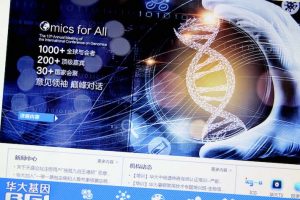Chinese biotechnology firm WuXi AppTec transferred a US client’s data to Beijing ‘without consent’ risking American national security interests, according to US intelligence officials.
Officials conveyed that information to US senators last month while the lawmakers prepared a biotech security bill targeting WuXi AppTec and other Chinese firms, sources familiar with the matter told Reuters.
The US government is concerned that certain Chinese biotech companies are contributing technology or research and development for use by China’s military.
Also on AF: ‘No One Can Stop China’s Tech Progress,’ Xi tells Visiting Dutch PM
The proposed legislation would restrict US government funds going to those Chinese companies. Pharma companies can be highly resource intensive as developing new drugs is a long and costly process.
WuXi AppTec’s services range from conducting research and development to making pharmaceutical raw materials and manufacturing drugs. Its customers include large pharmaceutical companies and small biotech firms.
US intelligence officials cited Wuxi’s alleged action to about a dozen senators and said the firm, along with other Chinese entities, had engaged in activity in the US contrary to US national security interests, sources said.
But the sources did not reveal the name of the client affected or the nature of the information Wuxi transferred, due to the sensitivity of the material.
The classified briefing was led by the FBI, the State Department and the Office of the Director of National Intelligence.
The Office of the Director of National Intelligence had warned in its annual threat assessment in February that Beijing was trying to fast track its science and technology development through IP theft and other means for economic and military advantage.
China demands evidence
Responding to the allegations, a WuXi AppTec spokesperson said the pharmaceutical firm “respects and fully complies” with the requirements of US federal and state authorities.
“We are not aware of any unauthorised transfers by WuXi AppTec of any US client’s data or intellectual property to China. Safeguarding our customers’ information is of the utmost importance to us, and we store it in keeping with their direction.”
About two-thirds of Wuxi’s sales last year came from the US. The company’s revenue has more than quadrupled from 2018 to 40.3 billion yuan ($5.6 billion) in 2023.
China’s embassy in Washington said Congress’ claims that WuXi AppTec posed a national security threat were unwarranted.
“If anyone believes that WuXi AppTec or its related companies have violated laws regarding intellectual property rights, they should provide convincing evidence to support their claims,” the embassy said.
Chinese biotech shares, valuations hit
The emergence of these allegations led Hong Kong-listed shares of Wuxi to pare early gains of nearly 5% and end trade end about 0.7% higher. Its Shanghai-listed shares also pared early gains to close with gains of nearly 1%.
The US Senate’s homeland security committee is considering the proposed Prohibiting Foreign Access to American Genetic Information Act of 2024 that could restrict business with Chinese biotech companies on national security grounds.
A committee aide for Democratic Senator Gary Peters, who heads the bipartisan homeland security committee, confirmed to Reuters that lawmakers received a recent briefing “to discuss the underlying biosecurity threats that the bill is trying to address so that members were well informed.”
Days after the briefing, on March 6, the committee approved the legislation. Its will now be considered by the broader Senate.
A similar bill — the Biosecure Act — introduced in the House alleged that WuXi AppTec and certain other Chinese companies have links to China’s military. The Chinese companies have said the legislation contains false, misleading and unfounded allegations.
News about the bills has driven WuXi AppTec’s shares down about 36% in Shanghai and about 54% in Hong Kong this year.
On Thursday, US-based data firm Morningstar cut Wuxi Apptech’s sister firm WuXi Biologics’ valuation from HKD 57.90 ($7.40) to HKD 28.60 citing uncertainties from the Biosecure Act.
“The Biosecure Act potentially prevents pharmaceutical firms from accessing US federal funds if they are in cooperation with certain firms that are perceived as threats to national security,” Morningstar analyst Yurou Zheng wrote.
Zheng noted that half of Wuxi’s 25 new projects are still coming from the US, adding that uncertainty in the US would mean slower growth for the firm.
Key US lobby drops backing
The Biotechnology Innovation Organization, which lobbies for companies in the sector, initially opposed the inclusion in the legislation of WuXi AppTec and others in the proposed senate bill.
But after February’s intelligence briefing, legislators or staff from both Republican and Democratic parties told BIO that they had received concerning information about WuXi AppTec’s relationship with the Chinese government, sources said. The substance of that information was not conveyed, they added.
Around the same time as the briefing, the Biden administration unveiled an executive order barring genomic and other data transfers to China over national security concerns.
US lawmakers’ concerns, as well as new direction from BIO’s recently appointed chief executive, John Crowley, helped spur the group to part ways with WuXi AppTec, sources said.
BIO had backed the company as recently as February, when then BIO CEO Rachel King wrote a letter to the Senate homeland security committee urging it to reconsider the proposed legislation.
A week after Crowley took over as CEO, however, BIO withdrew its support for WuXi AppTec, citing US national security, and endorsed biosecurity legislation.
Crowley described BIO’s turnabout as “an evolution” and said the group wanted to work with lawmakers on legislation and to bring biomanufacturing back to the United States.
The Senate committee’s vote on the bill and public pressure from the sponsor of the House version, Representative Mike Gallagher, were among the factors behind the decision, Crowley said.
“We can’t let China be the biotech center of excellence,” he said.
- Reuters, with additional inputs from Vishakha Saxena
Also read:
China’s WuXi Stocks Plunge on Fears Over US Biotech Bill
Wuxi Biologics Shares Jump on Hope it May Get Off US Blacklist
US Adds China Entities to Red-Flag Export List, WuXi Biologics Hit
WuXi Biologics Reassures Investors Over US Blacklist
WuXi Biologics to buy Pfizer drugmaking facilities in China
US to Block Personal Data Sales to China, Russia – engadget























